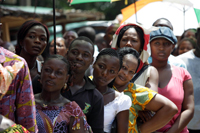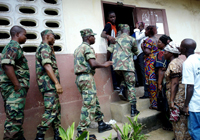Smart Power for Sustainable Peace in Côte d’Ivoire
As a delegation arrived in Côte d'Ivoire at the end of December 2010 in an effort to end the nation's political crisis, USIP's Raymond Gilpin looks at the prospects for peace in that country.
December 28, 2010
Since Côte d’Ivoire’s constitutional court overturned the internationally-recognized results of the presidential elections on December 3, 2010 and declared Laurent Gbagbo the winner, the country has been in political limbo. Almost 200 people have died in election-related violence, human rights violations have increased, the international community has been strident in its condemnation, and neighboring countries have threatened to remove Gbagbo by force. The constitutional court (headed by Paul Yao Ndre, a Gbagbo supporter) accused supporters of the opposition leader, Alassane Ouattara, of voter intimidation in some northern districts and discounted thousands of votes, effectively reversing a 54%-46% win for Ouattara to a 51%-49% result in favor of Gbagbo. Both Gbagbo and Ouattara staged swearing-in ceremonies on December 4, 2010. The resulting impasse has paralyzed Côte d’Ivoire and has led to strong condemnation and sanctions from the United States, the African Union, the United Nations, the European Union and a host of African countries. In addition, international financial institutions (most notably the World Bank and the West African Monetary Union) have suspended all relations with the Gbagbo regime. The Economic Community of West African States has threatened to remove Gbagbo by force if he does not leave voluntarily.
A Complex Calculation
Unlike the civil war of 2002-2003, the current stalemate is not a north-south issue. Although Ouatarra and his Rally of the Republicans (RDR) party draws most of its support from the largely Muslim north, he has forged a coalition with Henri Konan Bedie - a former Ivorian president and flag bearer of the southern-based Democratic Party of Côte d’Ivoire (PDCI). While Gbagbo certainly has significant support in and around the capital, Abidjan, the power base of his Ivorian Popular Front (FPI) party is in the west. Strategies based on the assumption of a strictly north-south divide could therefore be counter-productive. More nuanced approaches are more likely to succeed.
Unlike most of its neighbors, Côte d’Ivoire is relatively prosperous, leading the world in cocoa and cashew nut exports. The diversified economy (including petroleum, manufacturing and a strong service sector) anchors economic activity in much of West Africa. Following half a decade of war and uncertainty, the economy rebounded in 2009, posting a healthy 3.8% growth rate. In May 2009, Côte d’Ivoire qualified for substantial debt relief, including $7 billion relief from major bilateral creditors. The World Bank’s four-year assistance strategy (July 2009 to June 2013) includes some $575 million in grant financing to support Côte d’Ivoire’s transition from post-conflict recovery to sustainable economic development. The current instability threatens to undermine recent progress and impose profound costs on the country and its people.
Considering the Options
 Allowing Gbagbo to remain at the helm will foment civil war. The Forces Novelle (led by erstwhile Prime Minister under Gbagbo and current Ouattara appointee for the same position) have made clear their intentions to resume hostilities if Gbagbo remains. War would increase military spending, decrease social spending and severely weaken the economy. Most international financial organizations have either denied Gbagbo access to the country’s foreign accounts or frozen the accounts. Imports of food and fuel will be hardest hit and Gbagbo will struggle to pay salaries. This scenario could play out for a significant period of time with Gbagbo struggling to hold on to power, while medium- to low-level violence is likely to persist.
Allowing Gbagbo to remain at the helm will foment civil war. The Forces Novelle (led by erstwhile Prime Minister under Gbagbo and current Ouattara appointee for the same position) have made clear their intentions to resume hostilities if Gbagbo remains. War would increase military spending, decrease social spending and severely weaken the economy. Most international financial organizations have either denied Gbagbo access to the country’s foreign accounts or frozen the accounts. Imports of food and fuel will be hardest hit and Gbagbo will struggle to pay salaries. This scenario could play out for a significant period of time with Gbagbo struggling to hold on to power, while medium- to low-level violence is likely to persist.
Removing Gbagbo by force will not be easy because he has the support of the Ivorian military. A multinational force from neighboring countries will encounter stiff resistance in and around the capital because they will be viewed as invaders. Sustaining the effort will be costly in lives and financial resources. Gbagbo’s defenders will wage both conventional warfare and an insurgency which will be difficult to contain or predict. This option is also likely to be protracted.
A government of national unity has already been tried in Côte d’Ivoire with mixed results. The civil war, which followed the contested 2000 elections, ended with the Force Novelles joining Gbagbo’s FPI in a coalition government. This time around, the issues are much clearer. An internationally-supervised election was hijacked by the constitutional court, led by a Gbagbo crony. There was a clear winner and a clear loser. Adopting this strategy will only reward impunity and deprive the Ivorian people of a much-deserved victory.
Counting the Costs
 Avoiding violent conflict is imperative. The alternative is likely to cost much more over the short to medium term. The key to resolving the impasse probably lies in ensuring that Gbagbo’s isolation is both comprehensive and complete. Key investors (in oil, financial services and agriculture) and key allies (particularly China and Russia) should join the growing wave of international concern and encourage Gbagbo to step down voluntarily. Effective diplomacy and sustained pressure could accomplish much more than a military intervention. It will also send a clear message that subverting the democratic process is a denial of the rights of millions and will not be tolerated.
Avoiding violent conflict is imperative. The alternative is likely to cost much more over the short to medium term. The key to resolving the impasse probably lies in ensuring that Gbagbo’s isolation is both comprehensive and complete. Key investors (in oil, financial services and agriculture) and key allies (particularly China and Russia) should join the growing wave of international concern and encourage Gbagbo to step down voluntarily. Effective diplomacy and sustained pressure could accomplish much more than a military intervention. It will also send a clear message that subverting the democratic process is a denial of the rights of millions and will not be tolerated.
Violent conflict in any form would have dire consequences. Millions will become displaced and dispossessed. The labor force on Côte d’Ivoire’s cocoa farms is predominantly from the north and neighboring Burkina Faso (approximately 3 million Burkinabe live and work in Côte d’Ivoire). Not only will these groups become internally displaced or refugees, they would also be singled-out by armed groups. The United Nations records point to a mounting death toll and growing human rights violations. Any strategy should involve a safety net for vulnerable groups - including women and children. A robust initiative to protect and provide for these groups could involve a broad range of institutions, including USIP. Avoiding violent conflict requires sustained and comprehensive political pressure to ensure peaceful change, tireless diplomatic efforts to ensure that the will of the Ivorian voters is respected, and conflict-sensitive economic development to ensure broad-based economic prosperity.
USIP’s work on mediation, vulnerable groups, and conflict-sensitive economic instruments are particularly noteworthy in this context. USIP’s experts could provide strategic guidance for policy makers, customized briefings/training for practitioners, and community-based mediation support.




